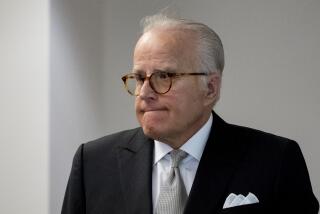House to continue probe of Rep. Jesse Jackson Jr.
The House Ethics Committee announced Friday it will continue to investigate whether Illinois Rep. Jesse Jackson Jr. or an emissary directed or knew of efforts to raise campaign cash for then-Gov. Rod Blagojevich in return for Jackson’s appointment to the Senate in 2008.
In making the announcement, the panel released findings from an initial review by another office that found “probable cause” that Jackson either directed someone to offer to raise funds in exchange for the seat or knew such an offer would likely be made. Jackson was never named to the Senate.
Jackson, 46, a Chicago Democrat, has been under scrutiny after his allies reportedly offered at least $1.5 million in campaign cash to Blagojevich for the appointment.
The ethics panel also has been examining whether Jackson misused federal dollars allocated for personnel and office expenses by utilizing “staff resources” to mount a “public campaign” to secure the appointment.
The Office of Congressional Ethics looked into the allegations in 2009. Unlike the House Ethics Committee, the office is not empowered to discipline House lawmakers, nor can it ascertain guilt or innocence.
But it did compile a report on its findings in August 2009. Among the key points:
-- “There is probable cause to believe that Representative Jackson either (1) directed a third-party, most likely Mr. Raghuveer Nayak, to offer to raise money for Governor Blagojevich in exchange for appointing Representative Jackson to the Senate seat, or (2) had knowledge that Nayak would likely make such an offer once Representative Jackson authorized him to advocate on his behalf with Governor Blagojevich.
-- “Because former Governor Blagojevich, Nayak and Mr. Rajinder Bedi [another fundraiser] have declined to cooperate with the OCE investigation, and because the OCE cannot compel their cooperation, the OCE is unable to determine whether there is a substantial reason to believe these allegations.”
Jackson has consistently denied any wrongdoing and renewed his denial Friday. He said in a statement he will “continue to fully cooperate” with the House Ethics Committee and expected to be “vindicated.”
“I have said from the beginning that I publicly and transparently sought to have the governor of Illinois appoint me to fulfill the final two years of then-Sen. Barack Obama’s term in the U.S. Senate,” Jackson said in the statement. “I did nothing illegal, unethical or inappropriate in that pursuit and I believe that is what the Ethics Committee will conclude at the end of this process.”
The congressman also said he was grateful that the committee has decided to release documents in the case, saying that for the first time in three years “my side of the story will be made public and for that I am grateful.”
One of the documents is a 17-page letter from two attorneys for Jackson. The letter, dated Nov. 15, was sent to the Ethics Committee chairman, Rep. Jo Bonner (R-Ala.), and to the committee’s top Democrat.
It says in part: “Congressman Jackson respectfully submits that there is no basis for OCE’s conclusion that he may have violated House rules or federal law and urges the committee to close its investigation of this matter.”
Last May, at the second of two Blagojevich corruption trials, Jackson contradicted prosecution witnesses and testified that he did not know about or authorize anyone to offer the governor money for the Senate seat.
Blagojevich will be sentenced Tuesday on 18 federal counts, including attempted extortion for trying to sell or trade the Senate seat, which became vacant when Barack Obama was elected to the White House.
Jackson, who represents the South Side and nearby suburbs, entered Congress in 1995. His father is civil rights leader the Rev. Jesse Jackson. The representative’s wife is Chicago Alderman Sandi Jackson.
Democrat Debbie Halvorson, a former congresswoman running against Jackson for his seat, released a statement saying “this is yet another day Congressman Jackson Jr. is focusing on his own self-preservation instead of bringing jobs to the district. These ethical distractions are just one reason why he is not qualified to represent the 2nd District.”
Halvorson, a former state lawmaker who served one term in Congress and lost a reelection bid in 2010, accused Jackson of being “more concerned with his own career than delivering for the district.”
The House Ethics Committee, which operates largely in secrecy, is composed of 10 lawmakers: five Republicans and five Democrats.
The duties of the House Ethics Committee include determining whether lawmakers have violated the House Code of Official Conduct. Among the code’s many provisions is a broad requirement that lawmakers behave at all times in a manner that shall “reflect creditably” on the House.
The committee has the authority to subpoena documents and witnesses and to compel testimony under oath. Testimony is taken by deposition, but people can invoke their 5th Amendment right against self-incrimination.
Officials said there is no hard timetable for the next phases of the inquiry into Jackson. An investigative subcommittee of four lawmakers from the Ethics Committee could be established.
If Jackson ends up formally accused of wrongdoing by the committee, the matter would move to an “adjudicatory phase,” where the burden is proof is lower than in criminal courts. “Clear and convincing evidence,” rather than evidence “beyond a reasonable doubt,” is required to establish guilt.
House members found guilty of violations are subject to sanctions: a letter of reproval, a fine, a reprimand, censure or, in the most serious cases, expulsion.
More to Read
Get the L.A. Times Politics newsletter
Deeply reported insights into legislation, politics and policy from Sacramento, Washington and beyond. In your inbox three times per week.
You may occasionally receive promotional content from the Los Angeles Times.






